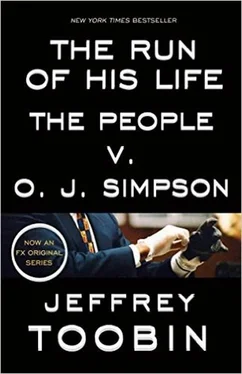McKinny produced the first draft of her screenplay in the late 1980s. She called it Men Against Women , after the organization Fuhrman had discussed with her. McKinny’s tale concerned a rookie female officer who falls in love with her partner, who turns out to be a member of MAW. Shopped around to various studios, McKinny’s work, like most screenplays, found no takers. Over the years, McKinny would serve as a rather extreme example of the difficulties of entering the screenwriting industry. In her entire career, she had never sold a single movie script, yet she continued to plug away. She taught part-time at UCLA and in the Malibu school district, all the while pursuing her research on the police project. However, she didn’t meet with Fuhrman at all between 1988 and 1993, when she took time off to raise her two small children.
It was during this fallow period that her screenplay nearly came to life as a commercial project. McKinny’s children attended a progressive school in Santa Monica called PS 1-short for “Pluralistic School number one.” Her children played with the kids of another parent at the school, a producer named John Flynn, who took an interest in McKinny’s project. Obviously, after all these years, there were no competing bidders, so in 1992 Flynn paid McKinny a token $1,000 for a two-year option on selling the script to a production company.
The early 1990s were a difficult period in McKinny’s life. Her husband, Daniel, was a cinematographer who sometimes found work as a grip on movie sets. Laura worked part-time tutoring UCLA athletes. In 1993, owing $80,000 in credit card bills and back taxes, the McKinnys declared bankruptcy. They decided to pick up stakes and sign up as professors at the fledging North Carolina School of the Arts. Notwithstanding her own lack of success in the field, Laura taught screenwriting. Still, she never gave up on Men Against Women . In the middle of 1994, with the option about to expire, Flynn had a nibble on the project. He had spoken to a representative of Fred Dryer, the handsome ex-football star who had starred in the archetypical LAPD television series Hunter . Flynn was going to meet with Dryer, so he called on McKinny and Fuhrman to join him in a strategy session to prepare the pitch.
The date of their meeting was July 28, 1994-six weeks after the murders and ten days after my New Yorker story about Fuhrman appeared. At the meeting, which McKinny taped, Fuhrman was still fuming about the story, vowing to sue Shapiro, who he assumed had leaked it. Fuhrman said he had even talked with an attorney who might represent him. “Well, the funny thing about it is,” Fuhrman told his colleagues, “just like the attorney said, ‘For the rest of your life, this is you: You’re Bloody Glove Fuhrman, that’s it.’… He says, ‘You might as well make it pay off; all you’re doing is going through this heartache for nothing. Go for Shapiro, he’s an asshole.’ ” In the end, though, Fuhrman felt confident that the LAPD would stand behind him in the growing controversy about his racial views. “I’m the key witness in the biggest case of the century,” Fuhrman boasted. “And if I go down, they lose the case. The glove is everything. Without the glove-bye-bye.”

Dryer passed on the project. But in anticipation of the negotiations with Dryer’s company, McKinny had hired an agent, Jim Preminger, the son of the famed director Otto Preminger, as well as another parent at PS 1. Preminger never heard the tapes, but he had a general idea of what was on them. When the trial heated up the following spring, he called McKinny and told her she probably should get a lawyer. McKinny asked a colleague in North Carolina for a recommendation, and he suggested Matt Schwartz, a young lawyer with whom the colleague had recently attended UCLA film school. (In Los Angeles, everyone writes screenplays, but what they really want to do-even the lawyers-is direct.) In late May 1995, McKinny called Schwartz and explained what the tapes were and how she and Fuhrman had come to make them.
McKinny was in a quandary. Her fondest hope was that some company would finally buy and produce Men Against Women , but Schwartz recognized that the tapes with Fuhrman’s voice were the more valuable commodity. Schwartz proposed-and McKinny agreed-that he “test the waters,” to check out the market for the tapes. In June, Schwartz contacted several outlets in the cash-for-trash industry-London newspapers, supermarket and television tabloids, and Faye Resnick’s publisher, Dove Books. Several expressed interest, and Schwartz faxed them nondisclosure agreements-documents that said the media outlets could examine the tapes, but only for the purpose of determining what to pay for them. Schwartz said later that he received a bid of $250,000 for the tapes, but McKinny turned it down.
Not surprisingly, Schwartz’s testing of the waters started the rumor mill working-and set off another feud within Simpson’s defense team. In early July, right around the time McKenna received the call from “Brian,” McKenna’s rival fellow investigator from the Shapiro camp in the defense team, Bill Pavelic, also heard about the tapes from a friend. This friend, a disbarred lawyer from near Oakland, told Pavelic that Schwartz was shopping the Fuhrman tapes to the tabloids, asking them to pay $10,000 just to listen to excerpts. (Schwartz later denied this.) Thus, Pavelic and McKenna both claimed to have “discovered” the tapes. In truth, McKenna had located the first direct route to McKinny, but Shapiro (who loathed McKenna, along with his allies Bailey and Cochran) wanted his own fingerprints on the discovery. Shapiro later went so far as to arrange for Skip Taft, Simpson’s business manager, to send the disbarred lawyer $1,500 (of O.J.’s money) for “your remarkable services in connection with the discovery of the Fuhrman tapes”-just to establish that Shapiro had played a role in tracking them down.
It was, in all likelihood, Schwartz’s proto-auction that prompted the call from “Brian” to Pat McKenna as well as the tip to Pavelic. In any event, when word of the tapes’ existence spread around the defense team during the second week in July, there was outright jubilation. “If this is real,” Barry Scheck said at a defense meeting, “it could mean an acquittal-flat out.” Gerry Uelman told McKenna, “This is manna from heaven.”
But it was Cochran who was moved the most deeply. He took an almost mystical joy in the subject of the McKinny tapes. Though nominally appalled by their contents, Cochran at one point told Judge Ito that the tapes were “like Lay’s potato chips-you can’t put them down, and you can’t eat just one.” Cochran had spent his entire professional career both fighting and exploiting racism in the LAPD. Now there was, it appeared, tangible proof of that racism, and it had surfaced in the most important case of Cochran’s career. Cochran could be bawdy, irreverent, and profane, but he displayed an unfeigned spiritual side in private as well. In all sincerity, Cochran told at least one colleague on the defense team that he believed God had brought the McKinny tapes to him. Cochran talked about, and seemingly thought about, the tapes all the time.
But Cochran had yet to get his hands on them. On July 12, the day of Cochran’s “sounds black” outburst during Robert Heidstra’s testimony, Cochran and Shapiro went to Matthew Schwartz’s office to try to get a commitment that they could have access to the tapes. In the meeting, Schwartz put them off. McKinny was on vacation at the time, and Schwartz wanted to play out his “testing the waters” project. (Later, both Schwartz and McKinny ascribed a great deal of significance to the semantic, and possibly meaningless, distinction between “testing the waters” and actually trying to sell the tapes.) Schwartz did at least promise Simpson’s lawyers that McKinny would not destroy the tapes. A week passed, and Schwartz finally said that McKinny would not surrender the tapes voluntarily. Schwartz now said McKinny regarded herself as a “journalist” in her meetings with Fuhrman, and she did not wish to share the fruits of her reporting. Frustrated, Cochran sent Carl Douglas to appear in secret before Judge Ito on July 20 and explain the situation to him. Ito agreed that the tapes were material to the Simpson case and signed a subpoena-which the defense team would now have to enforce in McKinny’s home state of North Carolina.
Читать дальше













